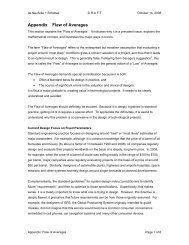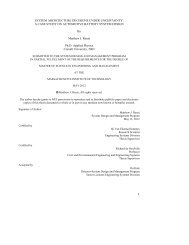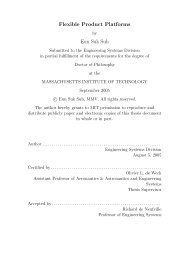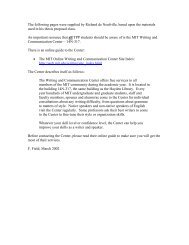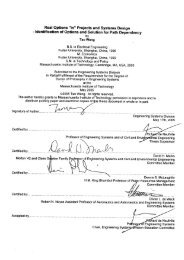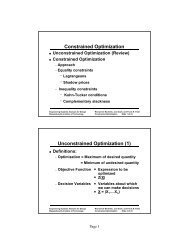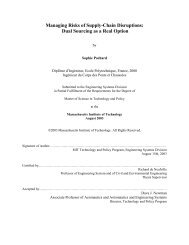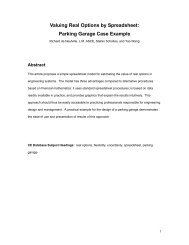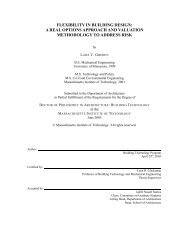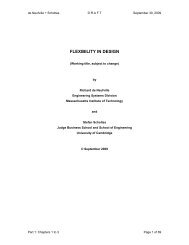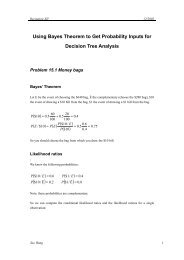Risk Management and Governance for PFI Project ... - Title Page - MIT
Risk Management and Governance for PFI Project ... - Title Page - MIT
Risk Management and Governance for PFI Project ... - Title Page - MIT
Create successful ePaper yourself
Turn your PDF publications into a flip-book with our unique Google optimized e-Paper software.
Introduction<br />
Japan has a long history of public-private partnerships (PPPs). It has promoted many projects based<br />
on the policy of PPP in various <strong>for</strong>ms since the enactment of the “Private Sector Resources<br />
Utilization Law” under Prime Minister Nakasone in 1986. Japan, however, has experienced many<br />
failures in the long history of PPP. The representative example is the management failure of the<br />
“Third Sector 1 ”, which means a joint corporation invested by both the public sector <strong>and</strong> private<br />
sector. In fact, many of the third sectors, which were mainly in the field of urban development, were<br />
successively bankrupted. In addition, large projects conducted by the third sector, such as Tokyo<br />
Bay Aqua-Line <strong>and</strong> Kansai International Airport 2 , have raised serious questions because of their<br />
optimistic dem<strong>and</strong> <strong>for</strong>ecasts <strong>and</strong> extremely large project costs in spite of their low profitability. The<br />
reason <strong>for</strong> these failed or questionable projects is because the governance of the third sector did not<br />
have a specific system of responsibility sharing but instead relied on a cozy relationship between<br />
the public sector <strong>and</strong> private sector, <strong>and</strong>, eventually, the overall governance of the project did not<br />
appropriately function.<br />
Based on these failed experiences, the new scheme “Private Finance Initiative” (<strong>PFI</strong>) was<br />
introduced <strong>and</strong> actively promoted with great expectations. <strong>PFI</strong> is based on the concept of clarifying<br />
the shared responsibility by contractual governance, which solves the problem of the ambiguous<br />
risk sharing that existed in the third sectors. Because the idea of a definite risk allocation of <strong>PFI</strong><br />
made it possible to produce the private sector’s ingenuities, many successful projects have been<br />
implemented that have achieved economical <strong>and</strong> efficient operation by utilizing the dynamism of<br />
private sectors. However, there are few <strong>PFI</strong> projects in Japan in the area of core infrastructure, such<br />
as airports <strong>and</strong> railways, while most of the projects are in building construction. Yet, under these<br />
circumstances, an amendment to the <strong>PFI</strong> law was enacted in May 2011 aiming to double the scale<br />
of the <strong>PFI</strong> operations in the subsequent eleven years. This progression would be expected to further<br />
increase the application field <strong>and</strong> the market size of the <strong>PFI</strong>. Based on this situation, this thesis<br />
reviews the previous experience of Japanese <strong>PFI</strong>s <strong>and</strong> tries to propose policy recommendations<br />
aiming <strong>for</strong> a better <strong>PFI</strong> project implementation in the near future. The following is a description of<br />
the structure of this thesis.<br />
Chapter 1 reveals the history of the introduction of PPP policy in Japan, cites some cases of failure<br />
of previous third sector projects <strong>and</strong> takes into consideration the lessons learned from those cases.<br />
Chapter 2 explains the general description of a Japanese <strong>PFI</strong>, which has been promoted due to the<br />
failure of the third sector. Also, it clarifies the reason why the Japanese <strong>PFI</strong> has not yet been<br />
prevalent. In addition, by pointing out the future expansion of the Japanese <strong>PFI</strong> market that is<br />
1 "Third Sector", in Japanese, means the joint sector of the first (public) <strong>and</strong> the second (private) sectors.<br />
2 Kansai International Airport Co., Ltd. is strictly not a “third sector” based on the general Commercial Code, but<br />
equivalent to a special company based on the special law (Kansai International Airport Co., Ltd. Law).<br />
13





